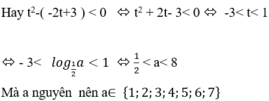Hãy nhập câu hỏi của bạn vào đây, nếu là tài khoản VIP, bạn sẽ được ưu tiên trả lời.


Câu 1:
\(\Leftrightarrow x^2-4x+5+\sqrt{x^2-4x+5}-5=m\)
Đặt \(\sqrt{x^2-4x+5}=\sqrt{\left(x-2\right)^2+1}=a\ge1\)
\(\Rightarrow a^2+a-5=m\) (1)
Xét phương trình: \(x^2-4x+5=a^2\Leftrightarrow x^2-4x+5-a^2=0\)
\(\left\{{}\begin{matrix}x_1+x_2=4\\x_1x_2=5-a^2\end{matrix}\right.\)
\(\Rightarrow\) Nếu \(5-a^2>0\Rightarrow1\le a< \sqrt{5}\) thì pt có 2 nghiệm dương
Nếu \(5-a^2\le0\) \(\Leftrightarrow a\ge\sqrt{5}\) thì pt có 1 nghiệm dương
Vậy để pt đã cho có đúng 2 nghiệm dương thì: (1) có đúng 1 nghiệm thỏa mãn \(1\le a< \sqrt{5}\) hoặc có 2 nghiệm pb \(a_1>a_2\ge\sqrt{5}\)
Xét \(f\left(a\right)=a^2+a-5\) với \(a\ge1\)
\(f'\left(a\right)=0\Rightarrow a=-\frac{1}{2}< 1\Rightarrow f\left(a\right)\) đồng biến \(\forall a\ge1\) \(\Rightarrow y=m\) chỉ có thể cắt \(y=f\left(a\right)\) tại nhiều nhất 1 điểm có hoành độ \(a\ge1\)
\(f\left(1\right)=-3\) ; \(f\left(\sqrt{5}\right)=\sqrt{5}\)
\(\Rightarrow\) Để pt có 2 nghiệm pb đều dương thì \(-3\le m< \sqrt{5}\)
Câu 2:
\(x^2-3x+2\le0\Leftrightarrow1\le x\le2\) (1)
Ta có: \(mx^2+\left(m+1\right)x+m+1\ge0\)
\(\Leftrightarrow m\left(x^2+x+1\right)\ge-x-1\)
\(\Leftrightarrow m\ge\frac{-x-1}{x^2+x+1}=f\left(x\right)\) (2)
Để mọi nghiệm của (1) là nghiệm của (2) \(\Leftrightarrow\left(2\right)\) đúng với mọi \(x\in\left[1;2\right]\)
\(\Rightarrow m\ge\max\limits_{\left[1;2\right]}f\left(x\right)\)
\(f'\left(x\right)=\frac{-\left(x^2+x+1\right)+\left(2x+1\right)\left(x+1\right)}{\left(x^2+x+1\right)^2}=\frac{x^2+2x}{\left(x^2+x+1\right)^2}>0\) \(\forall x\in\left[1;2\right]\)
\(\Rightarrow f\left(x\right)\) đồng biến \(\Rightarrow\max\limits_{\left[1;2\right]}f\left(x\right)=f\left(2\right)=-\frac{3}{7}\)
\(\Rightarrow m\ge-\frac{3}{7}\)

Lời giải:
$\log(8.5^x+20^x)=x+\log 25$
$\Rightarrow 8.5^x+20^x=10^{x+\log 25}=10^x.25$
$\Rightarrow \frac{8.5^x+20^x}{10^x}=25$
$\Leftrightarrow \frac{8}{2^x}+2^x=25$
Đặt $2^x=t$ thì $\frac{8}{t}+t=25$
$\Leftrightarrow t^2-25t+8=0$
Dễ thấy PT trên luôn có 2 nghiệm dương $t_1,t_2$ nên kéo theo PT ban đầu có 2 nghiệm $x_1,x_2$
Tổng các nghiệm $x_1+x_2=\log_2(t_1)+\log_2(t_2)=\log_2(t_1t_2)=\log_2(8)=3$

Chọn C.
Bất phương trình

Đặt ,  khi đó bất phương trình trở thành x2-2tx-2t+3> 0 (*)
khi đó bất phương trình trở thành x2-2tx-2t+3> 0 (*)
Bất phương trình (*) nghiệm đúng với mọi x khi và chỉ khi

Vậy có tất cả 7 giá trị nguyên của a thỏa mãn yêu cầu bài toán.

ĐK: x > 0
\(0< x< 1\Leftrightarrow\log_2x< 0\)
Đặt \(t=\log_2x\), pt đã cho trở thành \(t^2-2mt+m+2=0\) (1)
YCBT ↔ pt (1) có hai nghiệm âm phân biệt
\(\Leftrightarrow\begin{cases}\Delta'>0\\S< 0\\P>0\end{cases}\) \(\Leftrightarrow\begin{cases}m^2+3m+2>0\\2m< 0\\m+2>0\end{cases}\) \(\Leftrightarrow-1< m< 0\)

bài2:
x4-2x2-3=-m
vế trái có x4-2x2-3=0
bảng
| x | -∞ -1 0 1 +∞ |
| f'x | - 0 + 0 - 0 + |
| fx | -4 -3 -4 |
phương trình có 4 nghiệm khi
-4<-m<-3
=> 3<m<4

lnx/e là \(\ln (\frac{x}{e})\) hay \(\frac{\ln x}{e}\) hả bạn?
\(\left(3^x-27\right)\left(x^2-x-20\right)\ge0\Leftrightarrow\left[{}\begin{matrix}-4\le x\le3\\x\ge5\end{matrix}\right.\)
\(\Rightarrow\) Có \(8+40-5+1=44\) nghiệm nguyên